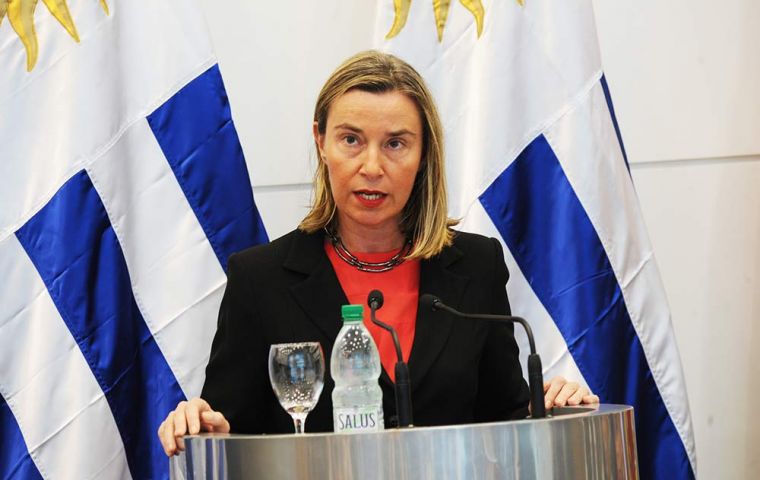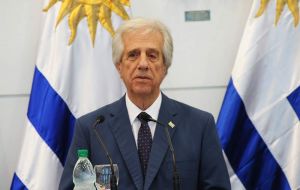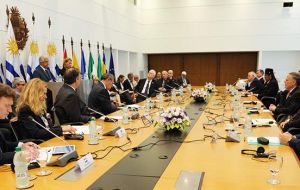MercoPress. South Atlantic News Agency
International Contact Group on Venezuela calls for fresh, transparent presidential elections
 EU Foreign Policy chief Federica Mogherini said a resolution ultimately must come from the people of Venezuela.
EU Foreign Policy chief Federica Mogherini said a resolution ultimately must come from the people of Venezuela.  Uruguayan president Tabare Vazquez and host of the meeting said “the biggest dilemma facing Venezuela is between peace and war”
Uruguayan president Tabare Vazquez and host of the meeting said “the biggest dilemma facing Venezuela is between peace and war”  The Mechanism of Montevideo group includes the Caribbean nations under Caricom, Bolivia, Ecuador and Costa Rica
The Mechanism of Montevideo group includes the Caribbean nations under Caricom, Bolivia, Ecuador and Costa Rica The European Union and a group of Latin American governments that have kept a moderate line on Venezuela called on Thursday for democratic and fresh elections, during a meeting held in Montevideo. The EU-backed International Contact Group on Venezuela said overly forceful intervention could aggravate the crisis.
EU Foreign Policy chief Federica Mogherini said a resolution ultimately must come from the people of Venezuela.
“This is not only the most desirable result but is the only result if we want to avoid more suffering and a chaotic process,” Mogherini said.
Uruguayan president Tabare Vazquez and host of the meeting said ”the biggest dilemma facing Venezuela is between peace and war, which is why we are insisting in our call for calm from the parties involved and the prudence of the international community”.
Maduro via Twitter welcomed the call for dialogue.
Critics have said three previous dialogue processes have allowed the ruling Venezuelan government to stall for time without making major concessions on key issues including imprisoned opposition politicians and electoral transparency.
However Thursday event was also a bit chaotic since in included the so called Montevideo Mechanism, sponsored by Mexico and Uruguay, a group which believes and sponsors an even more hands-off attitude towards Venezuela, by simply promoting dialogue, communications, good will and no conditions.
To this effect the Mechanism group that also includes the Caribbean nations under Caricom, Bolivia, Ecuador and Costa Rica decided to send a delegation of notables to Venezuela with the purpose of establishing communication and dialogue between the conflicting sides.
The chosen sage are Rebeca Grynspan, ex Costa Rican vice-president; Uruguayan ex foreign minister and ex CEO of the Inter American bank Enrique Iglesias; Bernardo Sepulveda Amor, Mexican ex foreign minister and ex member of the International Criminal Court Justice, plus Sir David Simmons ex head of Barbados Supreme Court.
But despite the harmonious evolution of the meetings, there were some surprises: Uruguay change sides, since under the Montevideo Mechanism it did not support a call and timetable for elections in Venezuela, but with the ICG statement effectively called for free, transparent, elections.
Bolivia a close ally of Maduro's Venezuela finally did not support the ICG or the Mechanism arguing that if there was a humanitarian situation any statement must mention the need for an immediate end to the sanctions imposed on the Maduro regime.
Mexico's foreign minister, Marcelo Ebrard, who now leads the Montevideo Mechanism said that the delegation of notables should be flying to Venezuela next week, and the priority is communication, establishing some sort of dialogue, the political issues are for the Venezuelans and should be addressed later, with no conditions.
Ebrard also mentioned that neither Russia or China, allies of the Maduro regime had been invited to the round of talks.
Follows the International Contact Group on Venezuela statement of Montevideo, 7 February:
Conscious of the severity of the current crisis in Venezuela and its impact in the region and deeply concerned by the plight of its people, the International Contact Group (ICG) on Venezuela held its first meeting in Montevideo on 7 February 2019.
The ICG aims to forge a common international approach to support a peaceful, political, democratic and Venezuelan owned resolution to the crisis, excluding the use of force, through free, transparent and credible presidential elections, in accordance with the Venezuelan Constitution.
In order for the country to overcome the current crisis, it is crucial to restore full democracy in all its dimensions, including rule of law, separation of powers and respect for the constitutional mandate of the country’s institutions, notably the democratically elected National Assembly.
The ICG stresses that the fundamental freedoms and human rights of all Venezuelans must be respected. It deplores the deaths and injuries caused by excessive use of force and underlines that violence is never a solution.
In its first meeting, the Group took stock of the situation in the country and discussed how the Group could best help in finding a peaceful path towards the holding of new Presidential elections with all the necessary conditions and guarantees in conformity with the Constitution, as laid out in the terms of reference of the ICG.
The ICG also recognized the humanitarian crisis that is deepening by the day, affecting millions of Venezuelans. The Group expressed its commitment to mobilize further assistance in areas of need and coordinate its delivery in liaison with the Joint UNHCR/IOM Special Representative, Mr. Eduardo Stein.
To that end, the ICG, through the co-chairs of the meeting, will proceed with the necessary contacts with relevant Venezuelan actors as well as with regional and international partners with the aim to: i) establish the necessary guarantees for a credible electoral process, within the earliest timeframe possible; ii) enable the urgent delivery of assistance in accordance with international humanitarian principles.
To implement these 2 goals, the ICG will send a technical mission to the country.
The ICG will reconvene at ministerial level by the beginning of March to take stock of progress.
This statement has been agreed by the following ICG members: the EU, eight of its Member States (France, Germany, Italy, The Netherlands, Portugal, Spain, Sweden and the United Kingdom) and three countries from Latin America (Costa Rica, Ecuador and Uruguay).




Top Comments
Disclaimer & comment rulesCommenting for this story is now closed.
If you have a Facebook account, become a fan and comment on our Facebook Page!